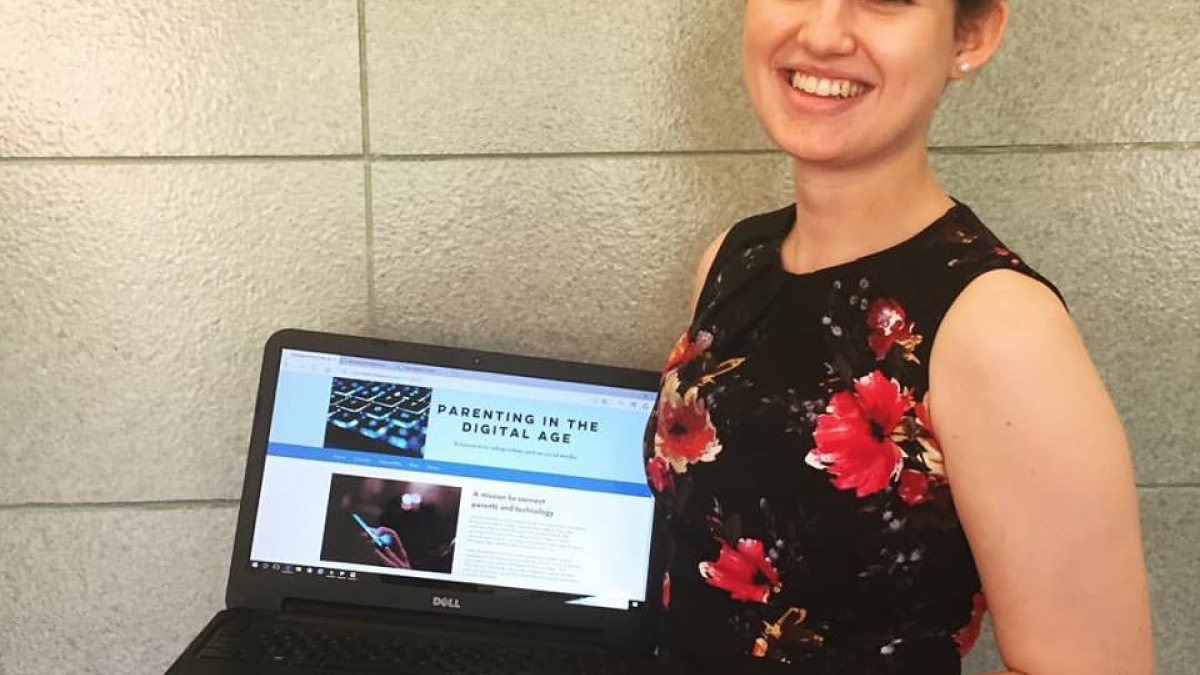ASU graduate creates website aimed at online safety for teenagers

May 2017 ASU honors graduate Jessica Swarner has created a website called Parenting In The Digital Age to help parents learn about Internet and social media safety for their teenagers.
In spring 2016, Jessica Swarner, then an Arizona State University junior majoring in political science and journalism, saw an alarming story about a young girl’s use of a messaging app.
According to the story, a 13-year-old girl from Virginia was killed by an 18-year-old man she had met on Kik, a mobile instant messaging app. Her parents had been unaware of their daughter’s use of the app and the dangers that could lurk there.
“It really scared me because I had a younger sister in high school at the time who was using Kik,” said Swarner, who graduated in May 2017 with a bachelor's degree and honors from Barrett, The Honors College at ASU.
Swarner already was doing research on cyberpsychology in a lab at ASU focusing on people’s attachment to their mobile phones, online communities, and cyber security, but when she saw this story, it really hit home. She decided to take her research into the realm of parental supervision of minor children’s Internet use, the safety of mobile apps, and online security.
What she found out is that many parents have little or no knowledge of what their children are doing online. In fact, according to a 2016 National Cyber Security Alliance study, 30 percent of teens said their parents were not aware at all or not very aware of their online activities. The same study showed that 57 percent of parents said they were unaware of what their children were doing online.
Swarner set out to rectify these facts. As her honors thesis project, she created a website that could serve as a resource for parents concerned about their children’s online activities. The result was Parenting In The Digital Age, an Internet and social media safety resource for parents of teens.
The site is full of useful information, including the pros and cons of internet and social media use; reviews and profiles of apps with features, policies, and safety and security measures; videos with tips from social media and public safety experts; and a constantly updated blog covering online safety.
“A significant issue is that because apps come and go so quickly it’s hard for parents to know what’s being used and what it’s being used for. So I try to keep up with that on the site by posting information about new apps and links to articles where parents can find more information,” she said. Subscribers to the site can receive weekly email updates.
Swarner suggests that parents create an action plan for their children’s online activity and social media use, and talk to their children about their concerns with things that can happen online, such as bullying, inappropriate conversations that include racist language, sexting, the use of fake profiles by people who would seek to cause harm, and communicating with strangers.
“It’s important for teens to, for example, use social media to connect with friends and to use the internet for homework, but they shouldn’t be given free reign. An action plan should address when and how teens can use their phone, what type of information should not be posted online, and how to be careful with the use of social media,” she said.
More University news

Professor recognized with prestigious award for mathematical excellence
Zilin Jiang, assistant professor jointly in the School of Mathematical and Statistical Sciences and the …

Unraveling molecular mysteries
Imagine being able to see something as tiny as a single molecule, which is a billion times smaller than a meter. Now imagine…

ASU researcher awarded $1.25M to develop programmable, targeted drugs
In a significant stride for medical research, Hao Yan, a professor in Arizona State University’s School of Molecular Sciences and…